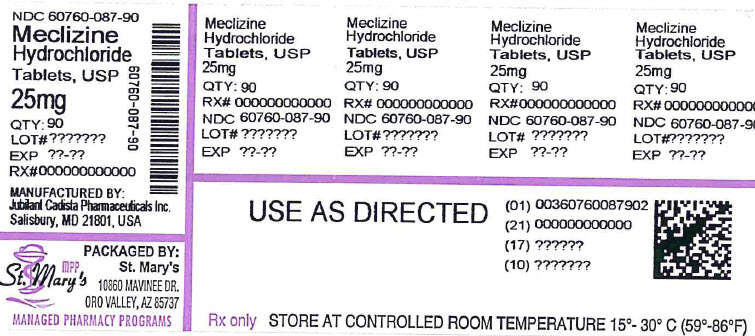MECLIZINE HYDROCHLORIDE
Meclizine hydrochloride tablets, USP Rx Only
87210edf-0bf9-2577-e053-2991aa0aaceb
HUMAN PRESCRIPTION DRUG LABEL
Dec 8, 2022
St. Mary's Medical Park Pharmacy
DUNS: 063050751
Products 1
Detailed information about drug products covered under this FDA approval, including NDC codes, dosage forms, ingredients, and administration routes.
Meclizine Hydrocloride
Product Details
FDA regulatory identification and product classification information
FDA Identifiers
Product Classification
Product Specifications
INGREDIENTS (8)
Drug Labeling Information
PACKAGE LABEL.PRINCIPAL DISPLAY PANEL

INDICATIONS & USAGE SECTION
INDICATIONS AND USAGE
Meclizine hydrochloride tablets are indicated for the treatment of vertigo associated with diseases affecting the vestibular system.
CONTRAINDICATIONS SECTION
CONTRAINDICATIONS
Meclizine hydrochloride tablets are contraindicated in individuals who have shown a previous hypersensitivity to it.
ADVERSE REACTIONS SECTION
ADVERSE REACTIONS
Anaphylactoid reaction, drowsiness, dry mouth, headache, fatigue, vomiting and, on rare occasions, blurred vision have been reported.
To report SUSPECTED ADVERSE REACTIONS, contact Jubilant Cadista Pharmaceuticals Inc. at 1-800-313-4623 or FDA at 1-800-FDA-1088 or www.fda.gov/medwatch.
DESCRIPTION SECTION
DESCRIPTION
Meclizine HCl, USP an oral antiemetic, is a white or slightly yellowish, crystalline powder. It has the following structural formula:

Chemically, Meclizine HCl is 1-( p-chloro-α-phenylbenzyl)-4-( m-methylbenzyl) piperazine dihydrochloride monohydrate.
Meclizine hydrochloride tablets, USP are available in two different strengths: 12.5 mg and 25 mg. In addition each tablet contains the following inactive ingredients: Colloidal Silicon Dioxide, Croscarmellose Sodium, Lactose Monohydrate, Magnesium Stearate, Microcrystalline Cellulose. Also, Meclizine hydrochloride tablets USP, 12.5 mg contains FD&C Blue #1 Aluminum Lake (11-13%) and Meclizine hydrochloride tablets USP, 25 mg contains D&C Yellow #10 Aluminum Lake (15-20%).
Each meclizine HCl 12.5 mg tablet contains 12.5 mg of meclizine dihydrochloride equivalent to 10.53 mg of meclizine free base.
Each meclizine HCl 25 mg tablet contains 25 mg of meclizine dihydrochloride equivalent to 21.07 mg of meclizine free base.
CLINICAL PHARMACOLOGY SECTION
CLINICAL PHARMACOLOGY
Meclizine hydrochloride is an antihistamine that shows marked protective activity against nebulized histamine and lethal doses of intravenously injected histamine in guinea pigs. It has a marked effect in blocking the vasodepressor response to histamine, but only a slight blocking action against acetylcholine. Its activity is relatively weak in inhibiting the spasmogenic action of histamine on isolated guinea pig ileum.
Pharmacokinetics
The available pharmacokinetic information for meclizine following oral
administration has been summarized from published literature.
Absorption
Meclizine is absorbed after oral administration with maximum plasma
concentrations reaching at a median T max value of 3 hours post-dose (range:
1.5 to 6 hours) for the tablet dosage form.
Distribution
Drug distribution characteristics for meclizine in humans are unknown.
Metabolism
The metabolic fate of meclizine in humans is unknown. In an in vitro metabolic
study using human hepatic microsome and recombinant CYP enzyme, CYP2D6 was
found to be the dominant enzyme for metabolism of meclizine.
The genetic polymorphism of CYP2D6 that results in extensive-, poor-, intermediate- and ultra-rapid metabolizer phenotypes could contribute to large inter-individual variability in meclizine exposure.
Elimination
Meclizine has a plasma elimination half-life of about 5-6 hours in humans.
WARNINGS SECTION
WARNINGS
Since drowsiness may, on occasion, occur with use of this drug, patients should be warned of this possibility and cautioned against driving a car or operating dangerous machinery.
Patients should avoid alcoholic beverages while taking this drug.
Due to its potential anticholinergic action, this drug should be used with caution in patients with asthma, glaucoma, or enlargement of the prostate gland.
PRECAUTIONS SECTION
PRECAUTIONS
Pediatric Use
Clinical studies establishing safety and effectiveness in children have not
been done; therefore, usage is not recommended in children under 12 years of
age.
Pregnancy
****Teratogenic Effects. Pregnancy Category B.
Reproduction studies in rats have shown cleft palates at 25-50 times the human
dose. Epidemiological studies in pregnant women, however, do not indicate that
meclizine increases the risk of abnormalities when administered during
pregnancy. Despite the animal findings, it would appear that the possibility
of fetal harm is remote. Nevertheless, meclizine, or any other medication,
should be used during pregnancy only if clearly necessary.
Nursing Mothers
It is not known whether this drug is excreted in human milk. Because many
drugs are excreted in human milk, caution should be exercised when meclizine
is administered to a nursing woman.
Hepatic Impairment
The effect of hepatic impairment on the pharmacokinetics of meclizine has not
been evaluated. As meclizine undergoes metabolism, hepatic impairment may
result in increased systemic exposure of the drug. Treatment with meclizine
should be administered with caution in patients with hepatic impairment.
Renal Impairment
The effect of renal impairment on the pharmacokinetics of meclizine has not
been evaluated. Due to a potential for drug/metabolite accumulation, meclizine
should be administered with caution in patients with renal impairment and in
the elderly as renal function generally declines with age.
Drug Interactions
There may be increased CNS depression when meclizine is administered
concurrently with other CNS depressants, including alcohol, tranquilizers, and
sedatives. ( see WARNINGS).
Based on in-vitro evaluation, meclizine is metabolized by CYP2D6. Therefore there is a possibility for a drug interaction between meclizine and CYP2D6 inhibitors.
DOSAGE & ADMINISTRATION SECTION
DOSAGE AND ADMINISTRATION
The recommended dose is 25 to 100 mg daily administered orally, in divided dosage, depending upon clinical response.
HOW SUPPLIED SECTION
HOW SUPPLIED
25 mg (Yellow, oval shaped tablets, debossed with “TL 121” with score on one side and plain on the other side.)
NDC
60760-087-90 BOTTLES OF 90
Store at 20 to 25°C (68 to 77°F) [See USP Controlled Room Temperature].
Dispense in a tight, light-resistant container (USP).
Keep this and all medication out of the reach of children.
Manufactured By:
Jubilant Cadista Pharmaceuticals Inc.
Salisbury, MD 21801, USA
Revised 01/2019
